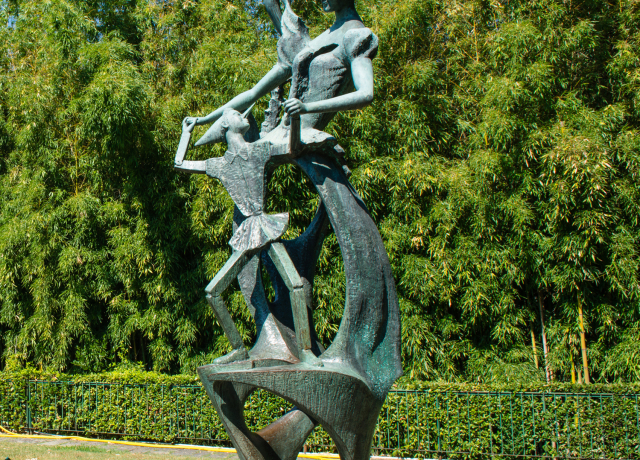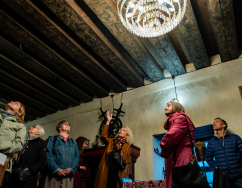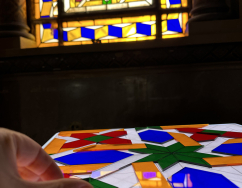European Heritage Days Article:
Exploring Cultural Heritage Through Fairy Tales with European Heritage Days Stories
European Heritage Days Article:
Exploring Cultural Heritage Through Fairy Tales with European Heritage Days Stories
Based in Italy, one of the projects awarded a European Heritage Days Stories grant in 2024 held a series of online and in-person activities relating to the cultural heritage of fairy tales and storytelling.
The European Heritage Days Story
The Story submitted for the European Heritage Days Stories initiative explained the importance of fairy tales to cultural heritage across Europe and their role as an intercultural educational tool for children. It was submitted by the European Fairy Tale Route – a Cultural Route of the Council of Europe – which aims to highlight the characters, authors and places which feature in the narratives, as well as the traditions, cultural identities and values that these tales convey.
Engaging with a wide audience
Contributing to the European Heritage Days shared annual theme, the Stories grant was used for activities exploring the intangible heritage of fairytales as a tool for intercultural dialogue. By including young people and involving participants from different social and cultural backgrounds, the project’s inclusive approach aimed to bring diverse perspectives and connect with an intergeneration audience. It was also designed to highlight shared values and reflect on issues of equality and inclusion such as gender representation in traditional narratives.
Exploring fairy tales through a publication and art exhibition
The European Heritage Days Stories grant was used for a series of events and meetings designed to collect a range of fairy tales from across Europe. Each participating country selected stories from their nation for a collective publication to serve as a future educational resource with a focus on both shared myths and values as well as recognising and celebrating local storytelling traditions. Working with Italian schools, the project also included an experiential element with artistic workshops for children held in early 2025. Young people were additionally involved in public meetings which brought together students, teachers and the wider community with experts discussing topics relating to storytelling traditions and heritage narratives.
Another element of the project saw an art exhibition hosted at the Collodi Foundation, a not-for-profit organisation in Tuscany which promotes children’s literary culture with a particular focus on the area’s links to the author of The Adventures of Pinocchio. European Heritage Days was discussed at this venue during a live and online conference on World Storytelling Day. This event saw members of the European Fairy Tale Route speaking on the topic ‘The Journey of Fairy Tales from Ancient Times to the Present Day’ as a celebration of the theme for 2024, ‘Routes, Networks and Connections’. Speakers also shared best practices from their theatrical, pantomime, storytelling, and narrative activities from the past year, while the event concluded with the unveiling of new sculptural installation based on the Pinocchio character.
Reflecting the shared cultural heritage of storytelling
Reflecting the transnational participation of the European Fairy Tale Route, the European dimension was a core part of the project with partners from multiple countries involved in running the project. International participation was encouraged from the initial meetings about the publication which took place in Hungary, through to events such as the conference discussing European Heritage Days which included talks from cultural organisations and museums including the National Leprechaun Museum in Ireland, the Swiss Fairy Tale Society and the European Society for Fairy Tales in Germany, alongside other speakers from Greece, Croatia, Italy and Poland.
Encouraging and supporting intercultural dialogue was integral throughout the project design, from the selection of fairy tales to the structure of activities, while the nature of storytelling was approached as a universal cultural resource with the potential to create links across linguistic and social borders. As such, participants were encouraged to look for common narratives as well as recognising cultural differences as a shared learning experience.
Future plans for the European Fairy Tale Route
The European Fairy Tale Route continues to run a programme of activities, with potential expansion to new partners and communities being considered across Europe. For this project, organisers were particularly pleased to note the enthusiasm and active participation of students who further continued their learnings from the events by developing follow-on projects, while schools involved with the project have indicated an interest in integrating the materials into ongoing educational materials. The publication of fairy tales from this project will also be available online as an ongoing public archive as part of the Route’s goals to help preserve and revitalise the intangible heritage of storytelling.
More information about the European Fairy Tale Route can be found on their website europeanfairytaleroute.eu, and their work can also be followed on Facebook and Instagram.


